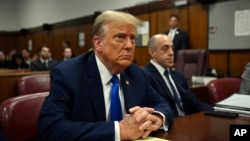Opening arguments are set to start Monday at the New York trial of Donald Trump, the first criminal case ever brought against a former U.S. president.
Prosecutors are expected to allege that Trump schemed in 2016, just before winning election, to hide hush money payments to two women to cover up their claims of alleged extramarital affairs with him.
Trump’s lawyers are likely to deny the affairs occurred, and to tell the jury that payments made to Michael Cohen were reimbursements for legal work, not hush money Cohen claims he paid porn actress Stormy Daniels.
Cohen, a convicted perjurer, was Trump’s one-time political fixer and personal lawyer, and is expected to be a key witness for the prosecution.
“I was paying a lawyer and marked it down as a legal expense.” Trump told reporters last week. “That’s exactly what it was."
Trump has pleaded not guilty to all 34 felony counts of falsifying business records. If convicted, he could be imprisoned for up to four years.
Trump was president from 2017 to 2021 and is the presumptive Republican presidential nominee in this year’s November election. Since he is required to be in court, the case almost certainly will limit his time on the campaign trail.
Seven men and five women were seated on the jury last Thursday to hear the evidence in the trial that could last six weeks. The jury includes two lawyers, six people who are employed at businesses, two who work in the education field, a health care worker and an engineer.
Some of the jurors acknowledged during the selection process that in recent years they had expressed negative views about the former president, but all said they could put those views aside and judge the case fairly.
Trump has often assailed New York Supreme Court Justice Juan Merchan in his social media posts and called the case “election interference.”
Trump could take the witness stand to defend himself, depending on how he and his lawyers view the prosecutors’ evidence.
Charges explained
Trump stands accused of hiding the $130,000 hush money payment to Daniels in the month before the 2016 election to keep her from talking publicly about her claim that she had a one-night tryst with him at a celebrity golf tournament a decade earlier.
In a second instance, the indictment cites Karen McDougal’s claim that she had a monthslong affair with Trump and was paid $150,000 by a tabloid publisher who bought the rights to her story and then, at Trump’s urging, killed the article.
Trump has denied both affairs, including that he directed Cohen to make the payment to Daniels and then reimbursed him during the first year of his presidency in 2017.
Altering his company’s ledgers would be a misdemeanor offense, but to convict Trump of a more serious felony, prosecutors will have to convince jurors he committed an underlying crime, such as trying to influence the outcome of the 2016 election by keeping information about the alleged affairs from voters.
It is not illegal to pay hush money, and Trump may claim the payments were made simply to avoid disclosure of personally compromising moments of his life, not to try to influence the election.
If the jurors fail to unanimously agree among themselves on a guilty verdict or an acquittal, there would be what is called a hung jury, leaving the prosecutors to decide whether to seek a new trial.
The New York case is one of an unprecedented four criminal indictments Trump is facing, encompassing 88 charges, all of which he has denied. The hush money trial, however, could be the only one that occurs before the November election.
Two of the other indictments — one state and one federal — accuse him of illegally trying to upend his 2020 loss, while the third alleges he illegally took hundreds of highly classified national security documents with him to his Florida estate when his presidential term ended, and then refused requests by investigators to return them.
No firm trial dates have been set in any of those three cases, and Trump has sought to push the start dates to after the election.
If he wins the election, he could seek to have the federal charges dismissed. In any event, if he returns to office, he would not be tried during his presidency.





